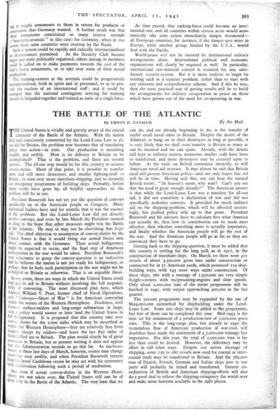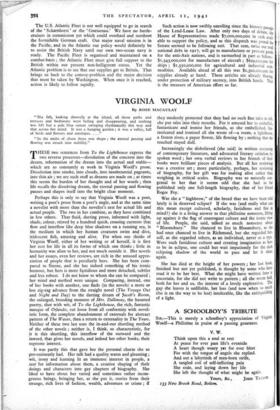THE BATTLE OF THE ATLANTIC By ERWIN D. CANHAM gi
Air Mail.
rp HE United States is vividly and gravely aware of the crucial 1 character of the Battle of the Atlantic. With the nation fully and consciously committed by the Lend-Lease Law to all- out aid for Britain, the problem now becomes that of translating policy into action—in time. Our production is mounting steadily and swiftly. How is its delivery to Britain to be accomplished? That is the problem, and there are several answers. The all-out way would be for this country to assume convoy-duties. Short of that ,point, it is possible to transfer more and still more destroyers and smaller fighting-craft to Britain ; to turn over more merchant-shipping, and to intensify our emergency programme of building ships. Probably, before many weeks have gone by, all helpful approaches to the problem will be in use.
President Roosevelt has not yet put the question of convoys specifically up to the- American people or Congress. Many individual leaders have said for months that it was the essence of the problem. But the Lend-Lease Law did not directly involve convoys, and even by late. March the President seemed to cling to the hope thattclher measures might win the Battle of the Atlantic. He may, di, may not be cherishing that bcpe still. The chief objection to assumption of convoy-duties by the United States is that it would bring our armed forces into direct contact with the Germani. Then actual belligerency might be expected to occur, and the final step of American Participation in the war would be taken. President Roosevelt's very reluctance to grasp the convoy-question is an indication that he believes the nation is not yet ready for belligerency, or Perhaps that he feels such participation in the war might not be so helpful to Britain as otherwise. That is an arguable thesis.
In any event, there are ways in which the United States could help get its aid to Britain without involving the full responsi- bility of convoying. The most discussed plan here, which Admiral William V. Pratt, former chief of Naval Operations, calls "Convoys—Short of War" is for American convoying Within the waters of the Western Hemisphere. Doubtless, with German surface-raiders and long-range submarines at large, such a policy would sooner or later land the United States in full belligerency. It is proposed that this eountTy take over convoy duties for the 2,000 miles which May be described as Within the Western Hemisphere—they are relatively free from dangers except by raiders--and leave the last 850 miles of hazard-filled sea to Britain. The plan would clearly be of great assistance to Britain, but at ponsent writing it does not appear that the Administration intends to go this far. As sea-losses ttinunt in these last days of March, however, events may change ftmentions very swiftly, and when President Roosevelt returns tom his latest Caribbean cruise he may act with his customary bold decisiveness following such a period of meditation.
And even- if actual convoy-duties in the Western Hemi- sphere are not taken over, the United States still can be of great help in the Battle of the Atlantic. The very least that we can do, and are already beginning to do, is the transfer of useful small naval units to Britain'. . Despite the desire of the Admirals to hang on to their destroyers as long as possible, it is very likely that we shall soon transfer to Britain as many as can be manned and we can spare. Already, with the details still kept as military secrets, numerous smaller craft have been so transferred, and more destroyers may be counted upon to follow. As the raids on British commerce intensify, so will American naval aid increase. It may almost be said that British need will govern American policy—and one only hopes that aid will be in time. Having said this, one can hear the natural British retort: "In heaven's name, why wait? Can't you see that the need is great enough already?" The American answer is that while the Lend-Lease Law was a mandate for all-out aid, it did not constitute a declaration of war and did not specifically authorise convoys. It provided for much indirect aid on the shipping-problem, which will be afforded unstint- ingly, but pushed policy only up to that point. President Roosevelt and his advisers have to calculate first what America can actually do, then how its contribution can be made most effective, then whether something more is actually imperative, and finally whether the American people will go the rest of the way. And the American people will go as far as they are convinced they have to go.
Getting back to the shipping-question, it mist be added that this country is settling for the long pull, as in 19i7, in the construction of merchant-ships. On March ist there were 451 vessels of about 3,500,000 gross tons under construction or contracted for in 51 American yards, which possessed 119 ship- building ways, with 143 more ways under construction. Of these ships, 260 with a tonnage of 1,950,000 are very simple freight-carriers with reciprocating-engines and slow speeds. Only about r,000,000 tons of the entire programme will be finished in 1941, with output approaching 400,000 in the last quarter.
The present programme may be expanded by the use of $629,000,000 earmarked for shipbuilding under the Lend- Lease Law. Some 200 ships may be added to the programme, but few of them can be completed this year. Mid-1943 is the time set for attainment of a production-rate of 5,000,000 gross tons. This is the long-range plan, but already in 1942 the tremendous flow of American production of war-tools will doubtless have made the attainment of a ,5,000,000 tonnage less imperative. For this year, the total of i,000,000 tons is far less than could be desired. However, the deficiency may be offset in still other ways. Despite our severe shortage of shipping, some 130 to 160 vessels now used for coastal or inter- coastal trade may be transferred to Britain. And the 589,000 tons of Danish, French, German and Italian ships now in our ports will probably be seized and transferred. Greater co- ordination of British and American shipping-efforts will also do a good deal to relieve the shipping-stringency the world over and make more bottoms available in the tight places. The U.S. Atlantic Fleet is not well equipped to go in search of the Scharnhorst ' or the Gneisenau.' We have no battle- cruisers in commission yet which could overhaul and outshoot the formidable German craft. Our major naval mission is in the Pacific, and in the Atlantic our policy would definitely be to assist the British Navy until our own two-ocean navy is ready. The Pacific Fleet is organised and maintained on a combat-basis ; the Atlantic Fleet must give full support to the British within our present non-belligerent status. Yet the Atlantic problem is to see that our supplies get to Britain. That brings us back to the convoy-problem and the major decision that must be taken by Washington. When once it is reached, action is likely to follow rapidly. Such action is now swiftly unrolling since the historic passage of the Lend-Lease Law. After only two days of debate, the House of Representatives made $7,000,000,000 in cash avail_ able to support the policy, and as this dispatch was posted the Senate seemed to be following suit. That sum, twice our total national debt in 1917, will go to manufacture or procure goods for the anti-Axis nations, and is earmarked in part as follows: $1,343,000,000 for manufacture of aircraft ; $629,000,00° for ships ; $1,350,000,000 for agricultural and industrial COM. modities. Available ahead of all this was $1,300,000,000 for supplies already at hand. These articles are already flowing, under protection of military secrecy, into British hands. That is the measure of American effort so far.































 Previous page
Previous page